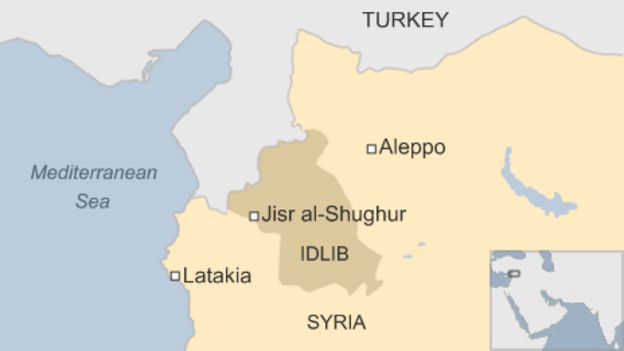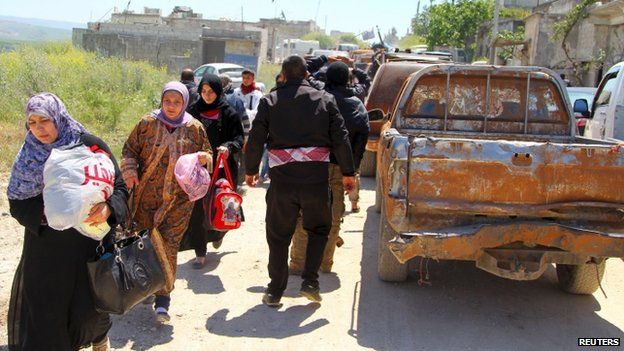Washington PostAssad’s hold on power looks shakier than ever as rebels advance in Syria Syrian President Bashar al-Assad speaks during an interview with France 2 television in Damascus, the Syrian capital, on April 19, 2015
Syrian President Bashar al-Assad speaks during an interview with France 2 television in Damascus, the Syrian capital, on April 19, 2015A surge of rebel gains in Syria is overturning long-held assumptions about the durability of President Bashar al-Assad’s regime, which now appears in greater peril than at any time in the past three years.
The capture Saturday of the town of Jisr al-Shughour in northern Idlib province was just the latest in a string of battlefield victories by rebel forces, which have made significant advances in both the north and the south of the country.
As was the case in the capital of Idlib province last month, government defenses in Jisr al-Shughour crumbled after just a few days of fighting, pointing as much to the growing weakness of regime forces as the revival of the opposition.
The battlefield shifts come at a time when the Obama administration has set aside the crisis in Syria to focus on its chief priorities: defeating the Islamic State militant group in Iraq and concluding a nuclear deal with Iran.
Yet the pace of events in Syria may force the United States to refocus on the unresolved war, which remains at the heart of the turmoil engulfing the Middle East, analysts say. Iran backs Assad, Saudi Arabia backs the rebels, and a shift in the balance of power in Syria could have profound repercussions for the conflicts in Iraq and Yemen.
“We’re seeing a game changer right now in Syria,” said Jamal Khashoggi, a prominent Saudi journalist. “I think we are going to see an end to the Assad regime, and we have to think now about what will happen the day after, because the day after is near.”
Other observers say the prospect of a government collapse in Damascus is still remote. The capital is well defended, and the rebels’ gains have come mostly on the periphery of the country, where the regime’s supply lines are stretched.
But perceptions that Assad will survive indefinitely or serve at least as an interim counterbalance to the Islamic State and its strongholds in northeastern Syria are in doubt, said Emile Hokayem of the International Institute for Strategic Studies.
The growing strains on Assad’s manpower and resources “are becoming extremely obvious, and the magnitude of his losses are now too big to hide,” Hokayem said.
“This destroys the narrative that he is winning, which he was counting on, and also the argument that he is the best option against ISIS,” the analyst added, using an alternative acronym for the Islamic State. “If he’s not able to take on or even defend against the rebels, he’s going to have a hard time presenting himself as able to fight ISIS.”
The revival of rebel fortunes is attributed to a large degree to the recent rapprochement between a newly assertive Saudi Arabia and its erstwhile rivals for influence over the rebels — Turkey and Qatar.
Since inheriting the throne in January, Saudi King Salman has moved forcefully to challenge the expanding regional influence of Iran, Saudi Arabia’s biggest foe, most publicly by embarking on an air war against Iranian-backed Houthi rebels in Yemen. He has also acted to shore up the flagging and deeply divided rebels in Syria, in coordination with Qatar and Turkey, Khashoggi said.
The result has been an unexpectedly cohesive rebel coalition called the Army of Conquest that is made up of al-Qaeda affiliate Jabhat al-Nusra, an assortment of mostly Islamist brigades and a small number of more moderate battalions. The coalition, which launched last month, has proved more effective than expected.
After seizing most of Idlib province in recent weeks, the rebels are pressing south toward the government strongholds of Hama and Homs and are threatening the Assad family’s coastal heartland of Latakia. A separate, more moderate rebel coalition has been making swift advances in the south, challenging government control over the key provincial capital of Daraa and making progress north toward Damascus.
Just as significantly, government forces have been proving increasingly ineffective. The collapse of two much-trumpeted offensives earlier this year, in southern Syria and in Aleppo, presaged the success of the recent rebel offensives, suggesting that even if the government can remain in control in Damascus, its chances of regaining the rest of the country are slipping.
There are signs that the regime itself is fraying under the strain of the four-year-old war. On Friday, pro-government news outlets reported the death of political security director Rustom Ghazaleh, a longtime Assad stalwart, after months of rumors that he had fallen out with the regime, had been badly beaten up by a rival and was languishing in a hospital.
The reports followed the firing last month of the military intelligence chief, Rafiq Shehadeh, another inner-circle loyalist. Western diplomats monitoring events in Syria from Beirut say the two men appear to have clashed with the Assad family over the growing battlefield role played by Iran.
The tensions are reaching into the heart of the Assad family, whose four-decade-old rule had seemed unshakeable until the revolt erupted in 2011.
Hafez Makhlouf, Assad’s cousin, was fired late last year as head of security in the province of Damascus and has since fled the country, the diplomats say. Another cousin, Munzer al-Assad, was detained this month amid rumors that he had been plotting a coup.
“It looks like there are major rifts going on inside the Assad regime,” one of the diplomats said. “A military collapse on the regime side is not impossible.”
Much will depend on Iran, which has stepped up in the past to dispatch men, money and arms whenever Assad seemed to be faltering. But Iran is stretched, too, by the economic effects of continued international sanctions and by the competing demands of the war next door in Iraq, which has diverted some of the Iraqi Shiite militias that had been fighting for the regime in Syria.
In a commentary for the Middle East Institute in the past week, Robert S. Ford, a former U.S. envoy to Syria, said a regime collapse cannot be ruled out. The regime’s schisms, its battlefield setbacks and its manpower shortages “are all signs of weakness,” he wrote. “We may be seeing signs of the beginning of their end.”
http://www.washingtonpost.com/world/mid ... story.html



































